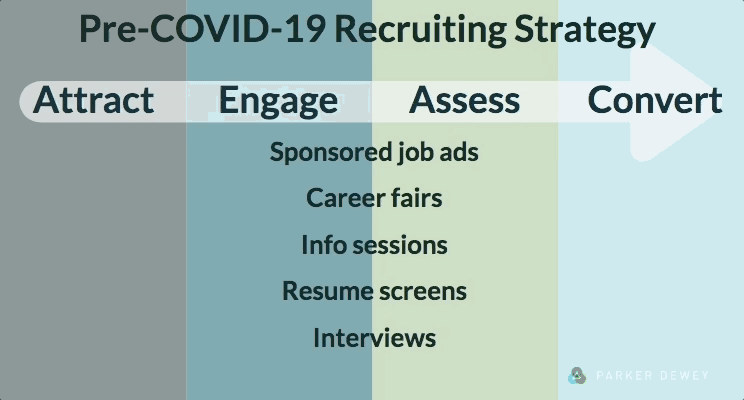.png)
Campus Recruiting and Challenges with Diversity
When it comes to hiring college graduates, both companies and universities face challenges tied to campus recruiting. But what about the students?
After hearing from university and recruiting leaders during our State of Campus Recruiting call, we invited Career Launchers to weigh-in on the biggest challenges they have throughout the campus recruiting process. Edmund Henry, a student at Cornell University, shared his perspective about what's working, what's not, and what college students want recruiters to know about campus recruiting. Read on for some of the highlights of our conversation.
Campus Recruiting: What's Working?
Internships are a recognized source of experience and path to being hired full time. In fact, Edmund points out that, "Beginning in the fall semester, many college students are already worried about securing a major internship within their field for next summer." Opportunities to meet hiring companies are plentiful, including information sessions, career fairs, networking events, coffee chats, and even directly reaching out to students through campus organizations. Though Edmund, a business student with an interest in eMarketing, cautions, "Limiting student engagement to on campus events is mistake for companies. Making use of ongoing email communication, videos, and other dialogue throughout the recruiting season can make or break your relationship with a potential candidate."
Campus Recruiting: What's Not Working?
Information sessions and career fairs aren't ideal for all students. With busy schedules, many students have to skip classes or leave sessions early, missing out on potentially vital insights about the company. Edmund also points out that companies doing on campus recruiting often fail to leave sufficient time at the end of their presentations for questions and answers, and to allow students to talk with them one on one. In addition, students have complained that at many information sessions companies share little information that students don’t already know or have access to online. "Focusing more on directly answering the students' questions may be the answer here, both benefiting diverse students and alleviating scheduling constraints for all busy students," shares Edmund. Moreover, students like Edmund are seeking more opportunities to work on short-term assignments for companies throughout the year, helping them get bite-sized insights into the companies, build meaningful professional relationships, learn about company culture first-hand, and explore careers before committing to summer internships, semester-long co-ops, or full-time jobs.
Edmund also brings to light how the practice of recruiting from campus professional organizations contradicts organization's efforts to be equal opportunity employers. For example, many of professional business organizations lack diversity and inclusion measures which is reflective in their membership. When companies then recruit heavily, or even solely form these organizations, minority students who lack connections and prior experience are excluded. While members of the organizations benefit from training and connections they provide, inequality for non-members grows. According to Edmund:
"Few or no organizations have helped me and many other students of color feel like they belong. Many of the business organizations on Cornell’s campus are extremely exclusive and are not very diverse in reality. I say in reality because a lot of organizations on my campus showcase the few LGBTQ, women, and people of color that they have as examples of diversity, although their diversity is limited."
Campus Recruiting: What Students Wish Companies Knew
To break the cycle of exclusion, Edmund encourages companies with diversity initiatives to take a hard look at whether or not the professional fraternities, clubs, and organizations they are recruiting from hold those same values and have inclusion measures in place. This will ensure that pre-professional societies and clubs are being held accountable by companies which pull from their membership. Further, Edmund suggests that the practice of focusing on specific campus organizations be sidelined. "In a world where companies seek to be equal opportunity employers, they need to reevaluate who is receiving these opportunities and whether the system is equal at all." When students of color, students from low income backgrounds, or first generation students are unable to have equal access to information regarding internships and job opportunities, they are excluded from applying to jobs they desire, encouraging a lack of diversity in the corporate world.
For Edmund and other Career Launchers from diverse backgrounds and experiences, they believe there are opportunities to improve campus recruiting practices. Students want to see companies do better at connecting with students on their schedules, engaging Career Launchers for short-term professional experiences, and examining the inclusion practices of the organizations where they recruit.



.png)
-1.png)
